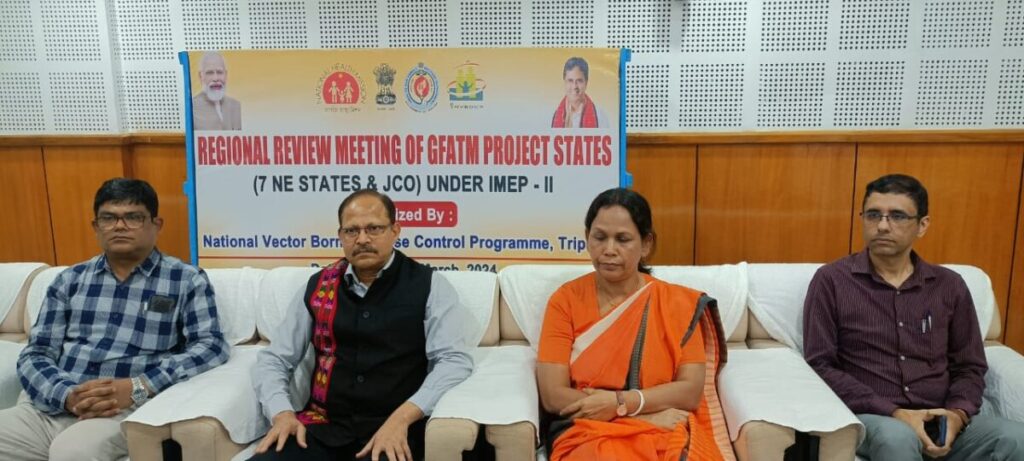Tripura, the northeastern state of India, recently played host to a significant health summit aimed at addressing the challenge of vector-borne diseases and setting ambitious targets for disease eradication. With a focus on malaria, dengue, and other mosquito-borne illnesses, the summit brought together policymakers, health experts, community leaders, and stakeholders to strategize and coordinate efforts towards achieving a malaria-free status for the state by 2027. This concerted effort underscores Tripura’s commitment to public health and its determination to tackle endemic diseases that pose a threat to the well-being of its citizens.
The health summit served as a platform for sharing knowledge, experiences, and best practices in vector-borne disease control and prevention. Key stakeholders, including representatives from the health department, non-governmental organizations (NGOs), academic institutions, and international agencies, came together to exchange ideas, assess challenges, and chart a course of action to eliminate malaria and other vector-borne diseases in Tripura. The summit facilitated collaborative partnerships and multi-sectoral cooperation, recognizing that a coordinated approach is essential for achieving meaningful progress in disease control and prevention.
At the heart of the summit’s agenda was the commitment to making Tripura malaria-free by 2027. Malaria remains a significant public health concern in the state, with certain areas facing high transmission rates and a disproportionate burden of the disease. The ambitious target of malaria elimination reflects the state government’s proactive approach and determination to combat the disease at its roots. By setting clear goals and timelines, Tripura aims to mobilize resources, galvanize support, and implement evidence-based interventions to achieve sustainable malaria control and ultimately eradicate the disease from the state.
The summit also addressed the broader issue of vector-borne diseases, including dengue, chikungunya, and Japanese encephalitis, which pose significant health risks to the population. Recognizing the interconnected nature of these diseases and the common vectors that transmit them, the summit emphasized the importance of integrated vector management strategies that target multiple diseases simultaneously. By adopting a holistic approach to vector control, Tripura seeks to maximize the impact of interventions and reduce the overall burden of vector-borne diseases on public health.
Central to the summit’s discussions were strategies for strengthening disease surveillance, early detection, and rapid response mechanisms. Timely and accurate data are essential for monitoring disease trends, identifying hotspots, and deploying targeted interventions where they are most needed. The summit highlighted the importance of leveraging technology, such as geographic information systems (GIS) and mobile health applications, to enhance disease surveillance and facilitate real-time data sharing among health authorities and stakeholders.
In addition to surveillance and response, the summit emphasized the importance of community engagement and participation in disease control efforts. Communities play a vital role in disease prevention by adopting preventive measures, such as using insecticide-treated bed nets, clearing mosquito breeding sites, and seeking timely medical care. The summit underscored the need for community-based initiatives that empower individuals and communities to take ownership of their health and actively contribute to disease control efforts.
Furthermore, the summit addressed the importance of strengthening health systems and building capacity at all levels to effectively respond to vector-borne diseases. This includes enhancing diagnostic capabilities, ensuring the availability of essential medicines and supplies, and training healthcare workers in vector control and disease management. By investing in health infrastructure and human resources, Tripura aims to build a resilient health system that can withstand public health threats and deliver quality care to all residents.
As the summit concluded, stakeholders reaffirmed their commitment to working together towards the shared goal of a malaria-free Tripura by 2027. The summit’s outcomes include the development of a comprehensive action plan, with clear strategies, targets, and timelines for disease control and elimination. Additionally, stakeholders pledged to mobilize resources, forge partnerships, and advocate for sustained political commitment to prioritize vector-borne disease control on the state’s public health agenda.
In addition, the health summit hosted by Tripura represents a significant milestone in the state’s efforts to combat vector-borne diseases and improve public health outcomes. By setting an ambitious target of achieving a malaria-free status by 2027 and adopting a multi-sectoral approach to disease control, Tripura demonstrates its commitment to protecting the health and well-being of its citizens. Moving forward, sustained political commitment, resource mobilization, and community participation will be essential for translating the summit’s aspirations into tangible results and securing a healthier future for all residents of Tripura.

